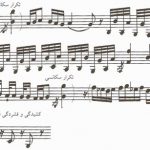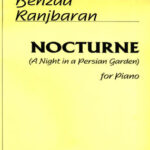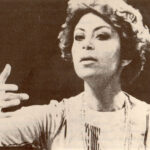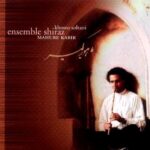No introduction is needed when talking about the position of the late Houshang Zarif (1938-2020) in the Iranian music. His character and personality are so well-known among musicians that his name per se is a symbol and role model for the Iranian youth. “Becoming Houshang Zarif” is the dream of many young people who enter the world of music in Iran and many of whom retire regretting the realisation of this dream.
Tag Archives: Houshang Zarif
Latest posts
- Transition to Enlightenment: Six Lectures on Mozart’s String Quartets (5)
- Nasser Masoudi: The Voice of Gilan and a Legacy of Iranian Music
- Farhad Poupel: The Voice of the Shahnameh in the Orchestras Around the World
- Five Major Myths About Mozart’s Life
- Bahma Rajabi Passed Away!
- Reza Vohdani; Unveiling unpublished works, preservation of Iranian classical music
- Ahmad Pejman Passed Away!
- Timeless or Timely: The Role of Historical Context in Defining Artistic Value
- Leading the Charge in Censorship
- The Legacy of Khosrow Jafarzadeh
- Transition to Enlightenment: Six Lectures on Mozart’s String Quartets (4)
- Fereydoun Shahbazian, An Iranian Musical Icon Passed Away
From Past Days…

Musical Sense or Technique?
One of the most popular terms used by Iranian instrumentalists is the existence or a lack of musical “sense”. Both musicians and fans of music consider having “sense” while playing music as an important principle to the extent that they use it vis-a-vis having technique.

Loss of Development in Iranian Music
The mention by music instructors, academicians, students, and music enthusiasts about the lack of development in Iranian music is a topic that has been repeatedly heard, resulting in a superficial understanding and misinterpretation of Iranian music, which has been conveyed to students of the arts. This short essay aims to critique and examine this claim.

A Persian Nocturne for Piano
A Night in a Persian Garden is the name of a Nocturne composed by the Persian (Iranian) contemporary composer Behzad Ranjbaran. This Nocturne, published recently by the Theodore Presser Company in the US, was performed for the first time in 2002 in New York City by the young Persian pianist Soheil Nasseri and has enjoyed many performances by other pianists.

“I Will Never Perform Just for Women!”: Golnoush Khaleghi Passes Away in Exile
Golnoush Khaleghi, first Persian woman conductor and daughter of legendary composer Rouhollah Khaleghi, passed away on February 14. She was 80. Golnoush Khaleghi was the conductor of the NIRT (National Iranian Radio & Television) Choir in the 1970s. Shortly after the 1979 Islamic Revolution Ms. Khaleghi moved to the United States and founded the Rouhollah…
Read More

Polyphony in Iranian Music (V)
In addition to the above-mentioned, polyphony can be also formed when a melody is performed by several singers in different ambiances or different sound registers according to their physiologic abilities. An example of this has been performed in rituals of Khanqah of Ghaderi darawish of Mahabad[i].

A Promising Concert by National Instruments Orchestra
The National Instruments Orchestra of Iran performed its first concert amid much hope and anxiety on July 18, 2015. The Orchestra is founded by Roudaki Cultural and Arts Foundation which is a semi-private foundation in Iran. The Arts Director for the National Instruments Orchestra of Iran is cand the Orchestra Executive Director is Sadjad Pourghand.

The Mystery of Messiah
Antonio Stradivari (1644 – 18 December 1737) was an Italian luthier and is considered the most significant and greatest artisan in this field.

Parviz Meshkatian’s Heart Beat for People (I)
Amidst the popularity of traditionalism in the Iranian music, Parviz Meshkatian (1955- 2009) moved from Neyshabur to Tehran. He learnt to play Santour and became educated in the Radif of Iranian music at the Centre for Preservation and Promotion of Music which was at the forefront of promoting the return to musical traditions. Despite his studies at a centre which promoted the use of the phrase “traditional music” in Iran, Parviz Meshkatian emerged as a creative artist whose innovative and unique ideas attracted the admiration of Iranian artists and people from different walks of life. This article studies the reason behind Meshkatian’s deviation from the wrong approach of traditionalism strongly promoted by the Centre and argues that apart from the issue of theory of Iranian music, he can be considered as Ali Naqi Vaziri’s successor.

A Miracle in the Iranian Music: About Tehran Flute Choir’s Eight-year Tenacity
Tehran Flute Choir is a 40-member orchestra of Iran’s best flutists; Iran’s best flutists? Yes! If you write down the names of the greatest Iranian flute players who participate at concerts and contribute to academic centers in Iran, you will see that most of them are among the choir’s members.

Persian Music: “Mahour the Great” in Austria
In 1990 an Austria-based Persian musician Khosro Soltani, in cooperation with Hossein Alizadeh, put out an album entitled, Ancient Call A New (Nobang-e Kohan). After many years, a few ancient Persian instruments such as Sorna, Karna, Naghareh,etc. have been used, instruments which have been left out of the circle of Persian classical musical instruments for centuries.